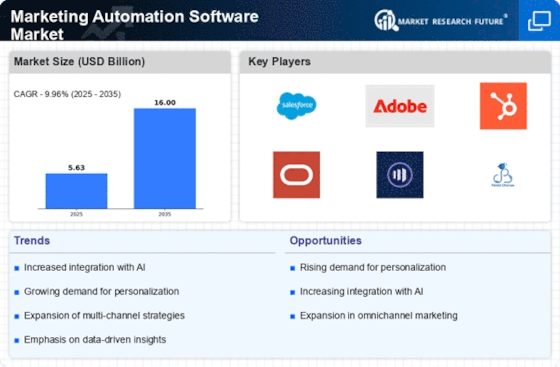Top Industry Leaders in the Marketing Automation Software Market

Competitive Landscape of Marketing Automation Software Market
The marketing automation software market is experiencing significant growth, fueled by the increasing demand for efficient and personalized customer engagement strategies. As businesses strive to optimize their marketing efforts and gain a competitive edge, the adoption of automation solutions is becoming increasingly widespread. This dynamic market landscape necessitates a keen understanding of the key players, their strategies, and the factors influencing market share analysis.
Key Players:
- Oracle Corporation
- IBM Corporation
- Act-On Software Inc.
- Adobe Systems Inc.
- Cognizant
- SAP SE
- SAS Institute Inc.
- HubSpot Inc.
- Salesforce.com Inc.
- Teradata Corporation
- Marketo, among others
Strategies Adopted:
The key players are adopting various strategies to maintain their market share and compete effectively. These strategies include:
- Product Innovation: Continuous development and enhancement of automation features to cater to evolving market demands.
- Strategic Acquisitions: Expanding their portfolios by acquiring promising startups and niche players.
- Partnerships and Collaborations: Joining forces with other technology providers to offer integrated solutions.
- Vertical Specialization: Tailoring their solutions to cater to the specific needs of different industries.
- Focus on AI and Machine Learning: Leveraging AI and ML to improve personalization, predictive analytics, and decision-making.
- Flexible Pricing Models: Offering diverse pricing options to cater to businesses of different sizes and budgets.
- Focus on Customer Success: Prioritizing customer support and training to ensure successful implementation and user adoption.
These strategies highlight the dynamic nature of the market and the constant need for innovation and adaptability to stay competitive.
Factors for Market Share Analysis:
Several key factors play a crucial role in analyzing market share within the marketing automation software market. These factors include:
- Product Features: The breadth and depth of automation functionalities offered, including email marketing, lead scoring, campaign management, and analytics.
- Market Reach: The geographical footprint and target markets served by the vendors.
- Pricing: The cost structure and pricing models offered, including subscription plans and enterprise options.
- Customer Base: The size and diversity of the customer base, including prominent brands and industry leaders.
- Brand Recognition: The reputation and market awareness of the vendors.
- Technology Partnerships: The strength and value of strategic partnerships and integrations with other technology providers.
- Customer Satisfaction: Customer reviews, testimonials, and satisfaction ratings.
By analyzing these factors, one can gain valuable insights into the competitive landscape and identify the dominant players in the market.
New and Emerging Companies:
The market is witnessing a wave of innovative startups entering the scene with niche offerings and disruptive technologies. These new players are challenging the status quo with innovative solutions that address specific needs and cater to underserved market segments. Some notable new entrants include:
- ActiveCampaign: A rapidly growing platform focusing on user-friendly automation features and affordability.
- Pardot: A B2B marketing automation solution known for its strong lead management capabilities.
- Drift: A conversational marketing platform focusing on live chat and chatbot functionalities.
- Moosend: A fast-growing email marketing automation solution with a focus on affordability and ease of use.
- Outfunnel: A data-driven marketing automation platform leveraging AI to personalize customer experiences.
These new companies are adding to the dynamism of the market and pushing the boundaries of what is possible with marketing automation.
Current Company Investment Trends:
Companies within the marketing automation software market are investing heavily in the following areas:
- AI and Machine Learning: Leveraging AI and ML to personalize customer journeys, optimize campaigns, and improve campaign performance.
- Customer Data Platforms (CDPs): Integrating CDPs with marketing automation platforms to unify customer data and provide a 360-degree view of customers.
- Marketing Analytics: Investing in advanced analytics capabilities to measure campaign performance, track ROI, and gain deeper insights into customer behavior.
- Omnichannel Marketing: Integrating marketing automation with other channels like social media and email marketing to create seamless customer experiences.
- Marketing Agility: Building flexible and adaptable platforms that allow businesses to respond quickly to changing market conditions and customer preferences.
Latest Company Updates:
Act-On Software, a provider of business marketing automation solutions that leads the industry in user efficiency and ease of use, announced today another victory for marketers in 2023: Act-On Advanced Analytics is an AI-powered suite of bespoke reporting and deep-dive analytics tools. Act-On Analytics gives marketers the power back in the form of useful, comprehensible, and shareable reporting and dashboards, eliminating the need for them to rely on IT and data analysts to do custom analytics on marketing campaigns.










